
In the vast and luminous history of Islam, there are names that shine brightly. Names that echo from minbar to minbar, remembered in khutbahs, biographies and classrooms. Yet, among them, there are some who remain less spoken about, not because their virtue was any less, but because their time was brief and their presence understated. One such noble figure is Lady Zaynab bint Khuzaymah, and she was a woman of immense compassion, remarkable dignity, and a legacy that continues to touch hearts centuries later.
Long before she became a Mother of the Believers, Lady Zaynab bint Khuzaymah was already well-known among the Arabs for her boundless generosity. She was so committed to the service of the needy that she earned the title “Umm al-Masakin” (Mother of the Poor), a name that wasn’t merely honorary, but deeply earned through years of active support for the vulnerable.
Even in the pre-Islamic society of Jahiliyah, when the norms were not kind to the weak, Lady Zaynab bint Khuzaymah still stood out. She would feed the hungry, clothe the poor, and visit the ill without seeking reward or recognition. It was as if Allah (SWT) was preparing her soul for the responsibility of being a wife to the greatest man to walk this earth: Prophet Muhammad (SAW).
Lady Zaynab bint Khuzaymah became one of the wives of the Prophet (SAW) in the third year after hijrah, around the age of 30. She was widowed twice before (her first husband was likely killed in battle), and she came into the life of the Prophet (SAW) at a time when many of the early Muslim women were suffering great loss due to war and persecution.
Her marriage to the Prophet (SAW) was a continuation of her life’s mission, and that was to serve. The Prophet (SAW) married her not only out of compassion but also as a way to honor her noble character and offer her stability. It is worth remembering that many of the Prophet (SAW)’s marriages were acts of social reform, setting an example for the Ummah on how to care for widows and vulnerable women.
Lady Zaynab bint Khuzaymah’s time with the Prophet (SAW) was brief. She passed away just eight months after their marriage. But her short tenure as Mother of the Believers did not diminish her standing. In fact, she holds the unique position of being the first of the Prophet (SAW)’s wives to die after him, and to be buried in Jannat ul Baqee.
It’s easy to overlook someone whose time in the limelight was so short. But Lady Zaynab bint Khuzaymah’s legacy doesn’t need decades to leave a mark. Her life teaches us that impact is not measured by duration, but by depth. How many of us will be remembered generations later simply for the mercy we showed others? How many of us would even put the welfare of the less fortunate before our own needs and desires? In a world that often glorifies wealth and visibility, Lady Zaynab bint Khuzaymah reminds us that, in the eyes of Allah (SWT), it is compassion, service, and sincerity that truly matter. She lived quietly, loved deeply, and gave endlessly – not for fame, but for the pleasure of her Lord. When was the last time we ever lived our lives in such a way?
In our communities today, the poor and the vulnerable still exist. The single mothers, the widows, the orphans, the homeless, all of them are modern masakin. If Lady Zaynab bint Khuzaymah were alive today, there is no doubt she would be among them, not just offering words, but extending her hand, her home, and her heart. For Muslims seeking to live meaningful lives, her legacy offers a clear example, and that is: do not wait for a platform to start giving. Your home, your presence, and your sincerity are enough to make a lasting impact. And perhaps most profoundly, Lady Zaynab bint Khuzaymah’s story tells us that you don’t have to be famous to be remembered by Allah (SWT).
It is time that we, as an Ummah, revive the memory of Lady Zaynab bint Khuzaymah. Let us speak her name in our homes, teach her story in our schools, and embody her character in our daily lives. Let us honor her by doing what she did best, and that was serving those who have less, without expectation.
In her quiet way, Lady Zaynab bint Khuzaymah lived a life of true Islamic excellence, one rooted in mercy, sacrifice, and love for others. May Allah (SWT) be pleased with her and allow us to walk in her footsteps, Ameen!



